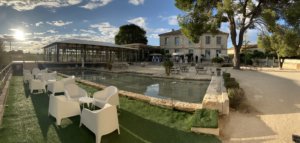Dear fellow mainframer,
I believe many of you, especially colleagues from Europe, have visited IBM Montpellier centre. Surprisingly, I’ve never been to Montpellier before. However, when I received the invitation to IBM zStudy 2023, I instantly decided to attend. Every mainframer owes it to themselves to visit one of the mainframe’s revered sites. Besides, experiencing the Indian summer in the south of France is an added bonus. I’ve just come back home, still digesting the content I swallowed last week in Montpellier; modernization, DevOps, containerization, quantum security, AI, sustainability, DORA…. Many good topics, but most of the conversations focused on in-place modernization and skills gap. Stay tuned for more updates on my Linkedin page, and a full report in October issue of Mighty Mainframe.

I had a strange dream that my office was redecorated in Barbie style, and I made a terrible mistake confessing my dream to my colleagues. After returning from summer vacation, my office was quite the spectacle. Pink ribbons, a pink pencil, my desk entirely enveloped in pink, and a pink unicorn adorning the meeting table. While my dream had nightmare turned into reality, it filled both my day and those of every passerby with laughter. I guess Barbie really is a hot theme right now, as the very next day I’ve stumbled upon the hilariously brilliant “Mainframer Barbie” project by PJ Catalano. You can follow him on LinkedIn or Instagram.

TOOLS MIGRATION
What are the most common reasons for replacing mainframe tools?
There might be many technical and organizational (or political) reasons, but cost is always the primary concern! Hence, business management or a CFO is usually pushing to replace the tool or vendor with a more cost-effective alternative.
At the same time, migrations are typically very difficult projects. People who originally designed the system are long gone, documentation is scarce, existing tools were not designed to support future migration, and new tools might have better features, but they work slightly differently than the old ones… And finally, engineers don’t like migrations due to their challenging nature, minimal reward and the looming threat of a ruined career in case of failed migration.
But, with proper planning, tool migration can be highly successful. Filip’s migration cookbook, which you’ll find below, is a great starting point. To begin with, be transparent about the risks, set a realistic timeline, and talk to your CFO honestly.
If you are seeking real-world insights, about migrating from CA Spool to _beta doc|z don’t miss the interview with Jens-Jørgen Rask from Beta Systems Software .
MAINFRAME MODERNISATION: How to break a monolith (without breaking anything)?
Breaking down a monolithic system might seem straightforward, but the intricacies involved are far from trivial. From identifying logical subsystems to introducing an orchestration layer between new applications and legacy monolith APIs, the project is complex and demands meticulous planning.
In Miroslav Čerkez’s case study “How to break a monolith (without breaking anything)?”, he delves into the challenges faced while extending and modernizing a system that has been evolving on the mainframe platform since the early 1990s. The core challenges? Ensuring seamless integration without compromising on decades of institutional knowledge encoded into the system. Dive into the case study to explore CROZ’s API-centric approach, the birth of ‘The Bus’, and the orchestration strategies employed to ensure a harmonious coexistence of the old and the new.
FUTURE PROOFING MAINFRAME TEAMS
A staggering 67% of Fortune 100 companies are deeply rooted in mainframe operations, underscoring their pivotal role in global transactions. Big portion of those companies are running legacy systems, but mainframe technology has evolved radically over last few years and today it supports absolutely all the latest and the greatest technologies, including AI and machine learning. However, with seasoned mainframe experts nearing retirement and a palpable skills gap emerging, the industry faces significant challenges.
We believe in-place mainframe modernization and empowerment of mainframe teams will future-proof mainframe’s central role in business.
We are going to bring you series of articles describing how to future-proof mainframe platform, starting with analysis of today’s challenges and possible solutions. We’ll discuss how to empower mainframe teams, outsourcing vs. managed services and best practices how to upbring new generation of mainframers. The solution is layered and demands a strategic approach. Read the first article here.
FEATURED CROZ EXPERT ARTICLE
In his first blog, Filip Djurikovic talked about the process of preparation for the tools replacement. Then he discussed the importance of testing new tools through a proof-of-concept phase. In the third and final chapter of Filip’s enlightening series on mainframe tools replacement, he shifts our focus to the execution and optimization stages. His blog will guide you through the meticulous steps of actual migration and the post-migration strategies to optimize performance, troubleshoot potential issues, and ensure continuous improvement
UPCOMING WEBINAR!
Through the IT history, the industry has saw and navigated through many different forms of systems architectures. From monolithic systems through various flavours of distributed system architectures like SOA, to latest trends based on microservices/containers and API centric systems.
Mainframe based applications as a cornerstone of big IT solutions have naturally followed suite gaining with each new generation ability to modernize is technical stack to incorporate into new system architectures. API centric systems present latest change that systems using mainframe need to adopt.
Join us on Building API layer on top of a mainframe webinar where we will share out experiences with incorporating mainframe into API centric architectures. Speakers: Ivo Stampalija & Miroslav Cerkez
INDUSTRY INSIGHTS
Podcasts are quite popular these days, you can find your favourite one no matter which subject. Mainframe is not left out of podcast frenzy. Here are two podcasts I was listening to lately:
This show offers a unique blend of interviews, discussions, and insightful tidbits about the mainframe ecosystem. In a recent episode, they were joined by Python and open source experts Joe Boston and Chad McIntyre. The podcast not only keeps listeners informed but also sparks engaging discussions on the future of mainframes and the role of languages like Python in democratizing the platform.
Mainframe, Performance, Topics
Hosted by Martin Packer, a principal z Systems investigator, and Marna Walle from z/OS development, this podcast offers a blend of timely, interesting, and entertaining z/OS topics. With a structure that includes a mainframe item, a performance item, and a general topic, each episode gives a comprehensive look into the ever-evolving mainframe landscape.
From vibrant office pranks to the depths of mainframe modernization, our journey is ever-evolving. From tool migrations to preparing our teams for the future, the importance of the mainframe’s legacy in our tech-driven world cannot be understated. Let’s remain inspired, harness the latest breakthroughs, and treasure the community connections we’ve cultivated. As always, I would love to hear your thoughts in the comments.
Is Mighty Mainframe interesting, informative, or does it put you to sleep? I’m looking forward to your opinion!
Related News



